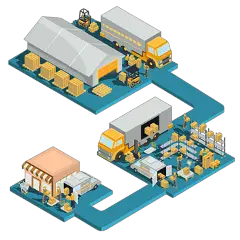The supermarket is large retail food stores selling groceries, fruits, vegetables, dairy and foods products. Therefore, A large retail business unit, selling mainly food and grocery items on the basis of low margin appeal, wide variety and assortments, self-service, and heavy emphasis on merchandise appeal.

Advantages of Supermarkets
Some of the important advantages of Supermarket may be explained as under:
1. Freedom of Selection
Customers enjoy full freedom of selection in supermarkets. As salesman are not appointed in these markets, customers select goods of their choice on their own.
2. Fixed Prices
Prices of all the goods at these stores are always fixed. No bargaining is allowed in prices.
Hence, these markets win the faith and favor of customers.
Related: 21 Advantages and Disadvantages of Chain or Multiple Stores.
3. Lower Prices
Prices of goods are generally kept low at the supermarket. Thus, these markets are suitable for both rich and poor people.
4. Availability of all the Goods of Daily Need
Supermarkets provide almost all the goods of daily and regular needs to the consumers under one roof.
Thus, they have not to move from one place to another for making their purchases.
5. Availability of Variety Goods
Supermarkets maintain a large variety of all the goods and thus, help customers in the selection of best goods.
6. Availability of Standard Goods
Supermarket deal only in standard goods. Customers believe that they are paying the right price for the right goods of the right quantity.
Related: Top 17 Advantages and Disadvantages of Departmental Stores.
7. More Sells
For the above reasons, the sells of supermarkets go very high.
8. More Profits
Through the margin of profit at supermarkets is kept very low, but the total amount of profit becomes very high.
9. No-Risk of Bad Debts
As Supermarket sells only for cash there is no risk of bad debts.
Related: 13 Main Types of Retailers in Marketing (With Examples).
10. Economics of Large Scale Operation
As a Supermarket is a large scale retail organization, it gets many economies of large scale operations.
Disadvantages of Supermarkets
Some of the important disadvantages of Supermarkets may be explained as under:
1. Need for Huge Amount of Capital
As Supermarket is a large scale retail organization and it deals in almost all the goods and services of daily use of consumers, it needs huge amount of capital to be invested.

2. Problem of Required Space
Supermarket required a large space and that too in the heart of big cities, but it is very difficult to find such a place in a big city these days.
Related: 11 key Difference between Departmental Store and Chain Store (Explain).
3. Difficult for Customers in Making Selections
No salesman is appointed in the supermarket, and thus, the customers have to select on their own.
It becomes very difficult for customers to do so without any aid.
4. Not Suitable for the Sales of Goods of Technical Nature
For supermarkets, is not very practical to provide after-sale services.
Therefore, goods of Technical nature cannot be sold in supermarkets.
5. Possibility of Spoil of Perishable Goods
As Supermarket deals in many perishable goods like vegetables, fruits, dairy products, etc.
These goods may be spoil if not sold within a limited time.
Related: 15 Functions and Services of Retailers with Examples.
6. Lake of the Facility of Credit
The supermarket sells goods only for cash.
Thus, the customers want to purchase on credit, cannot do so from supermarkets.
7. Fewer Opportunities for Employment
As no salesman are appointed in supermarkets, least employment opportunities are provided by these markets.
8. Minimum Satisfaction of Consumers
Customers have to select the goods on their own without any aid and no extra facility is provided to them in these markets, and they feel least satisfied.
Related: 15 Major Importance of Creativity in Entrepreneurship.
Salient Features of Supermarkets
Important features of Supermarket may be explained as under:
- Almost all the goods of daily and regular needs of consumers are sold at supermarkets, such as – goods of grocery, goods of cosmetics, vegetables, fruits, clothes, readymade garments, sports goods, stationery, etc.
- Goods are displayed in open racks.
- Customers get full freedom of selection of goods. A customer is not aided by the salesman while making selections.
- Goods are purchased directly from manufacturers or wholesalers.
- Prices are generally kept lower than market prices.
- Goods are sold only on a cash basis.
- No salesman is appointed and hence supermarkets are known as self-service stores.
- Supermarkets are generally located in Central places in big cities.
Related: Top 12 Techniques of Decision Making (Step by Step).
Conclusion
The supermarket is a large scale retail organization which provides almost all the goods of daily need.
Supermarkets are operated without the aid of salesman and provide the full opportunity for the selection of goods to the customers.
Goods are displayed in open racks. The customer enters the market and selects the goods of his choice all his own. He puts all the goods selected by him on a trolley available in the market. What are the advantages of hypermarket?.
The customers make the payment of the bill at the cash counter and take the delivery of goods.
Thus, now you know the advantages and disadvantages of supermarkets.

Nicely explained to have basic idea on this model
how can i help you again
Thankyou so much to give detail information about super market